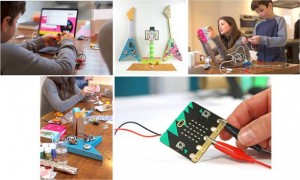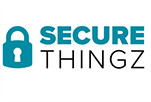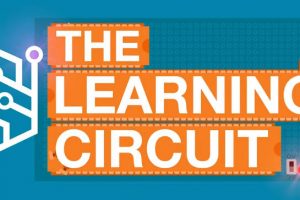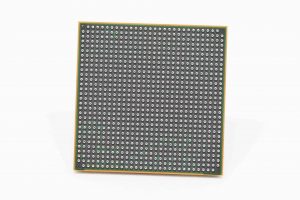
“Our role in the project was to take the prototypes for the BBC micro:bit, which were based on the ARM mbed reference designs in the mbed hardware development kit (HDK), and optimise them for mass manufacturing,” said element14. “The initial design called for a complex and expensive routed design, however the cost was significantly reduced without sacrificing the quality of the finish.”
The firm became aware of the project in February 2015 and made a proposal for cost optimisation and manufacturing support. It was invited to engineer out the unknowns in the design and act as arbitrator between the needs of the working group and the practicalities of manufacture.
See also: Hands on the BBC micro:bit »
Micro:bits have child-friendly part labelling showing the location of components such as the accelerometer and compass.
“In most development kit designs the appearance is secondary to the functionality but, as this board is aimed at children, it needed to be both functional and friendly,” said element14, which worked with the BBC, ARM, Microsoft and design company Technology Will Save Us (see below) to understand the aesthetic. “We have manufactured it in four different colours, which we believe is a first.”
NXP won places for a Kinetis KL26 ARM Cortex-M0+ MCU (of the USB interface, Nordic Semi provides the Cortex-M0 Bluetooth and application processor), a MMA8652 3-axis accelerometer, a MAG3110 3-axis magnetometer, and PRTR5V0U2F for electro-static protection.
“We’re giving micro:bits to our employees’ children in the 11-12 age-range this year. Consistent with the BBC’s exemplary goals, we want to foster a passion for learning and technology and develop core engineering competencies at an early age.” said NXP CEO Rick Clemmer.
One million year 7 students in the UK will receive micro:bits as part of a BBC scheme to encourage them to learn coding and develop science, technology and engineering skills.
See also: Micro:bit reunites BBC and ARM for grand education initiative »
 London-based Technology Will Save Us makes DIY gadget kits for children inspired by everyday hobbies to teach digital and physical technology skills.
London-based Technology Will Save Us makes DIY gadget kits for children inspired by everyday hobbies to teach digital and physical technology skills.
It led the design of micro:bit’s appearance, and also designed and coded the software which boots onto the processor when it is first switched on – to show that the 5 x 5 led matrix can do and introduce the buttons and accelerometer.
Plus, it created the accompanying on-line ‘making platform’ that gives children ideas and recipes for projects.
BBC micro:bit partners
- ARM: micro:bit was created using the ARM mbed hardware and software development kits and compiler services. The project builds on the organisations’ collaboration on the original 1981 BBC Micro computer.
- Barclays: Supporting the distribution and manufacture of the BBC micro:bit by incorporating it into their digital education programmes – Code Playgrounds run by Barclays Digital Eagles on-line and in branches, and the LifeSkills programme.
- BBC: The BBC micro:bit project has been conceived and convened by the BBC, bringing together partners to deliver a digital literacy project.
- element14: (see above) manufacturers the micro:bit and worked with all partners in component selection, cost optimisation and design for manufacture. It also used its manufacturing, logistics and packaging resources to deliver the first 1 million units into the UK.
- Lancaster University: Designed and developed the core code (runtime). The University will continue to support the micro:bit community as it grows, and is organising research into how the micro:bit is being used, helping to improve its effectiveness.
- Microsoft: Developed the BBC micro:bit website to host code editors the one million micro:bits, and supplied two coding languages: text-based Microsoft Touch Develop and graphical Microsoft Block Editor. It provided learning resources, and produced a getting started guide for teachers and students.
- Nordic Semiconductor: Supplied the Bluetooth chip, which includes the main application processor (32bit ARM Cortex-M0) as well as linking to smartphones, tablets, and computers.
- NXP Semiconductor (see above): Provided the 32bit ARM Cortex-M0+ microcontroller that manages the USB connection, as well as the accelerometer, magnetometer and electro-static protection device.
- Samsung: Developed the Android app that allows connection to phones and tablets, and supports coding. It also developed student projects and teacher resources.
- Technology Will Save Us (see above): A London-based start-up that designs DIY tech kits intended to spark creativity in young people. Tech Will Save Us led the BBC micro:bit design, producing the ‘look and feel’. Also designed and coded the Hello World behaviour at first power-up. It has an on-line catalogue of maker projects for home and school.
- Wellcome Trust: Through direct initiatives to schools, will provide exciting real-life contexts for teachers and learners around the UK to use the micro:bit.
micro:bit supporters, for services, outreach, engagement, educational resources, include:
- Big Learning Company
- Bluetooth SIG
- Cannybots
- CISCO
- Code Club
- Code Kingdoms
- CoderDojo
- Creative Digital Solutions
- CultureTECH
- Institution of Engineering and Technology
- Kitronik
- London Connected Learning Centre
- MyMiniFactory
- National STEM Learning Centre
- Philip Harris
- Python Software Foundation
- ScienceScope
- STEMNET
- Tangent
- TeenTech
- Tinder Foundation
 Electronics Weekly Electronics Design & Components Tech News
Electronics Weekly Electronics Design & Components Tech News



